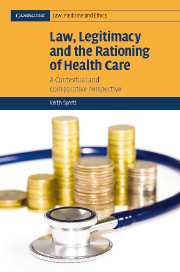Book contents
- Frontmatter
- Contents
- Table of Cases
- Acknowledgements
- 1 Introduction
- 2 Why ‘Ration’ Healthcare Resources?
- 3 How Rationing Takes Place
- 4 Rationing and the Problem of Legitimacy
- 5 Rationing and the Courts: Theoretical Perspectives
- 6 Rationing in the Courts: England
- 7 Rationing in the Courts: Canada
- 8 Rationing in the Courts: South Africa
- 9 Conclusion
- Index
2 - Why ‘Ration’ Healthcare Resources?
Published online by Cambridge University Press: 27 July 2009
- Frontmatter
- Contents
- Table of Cases
- Acknowledgements
- 1 Introduction
- 2 Why ‘Ration’ Healthcare Resources?
- 3 How Rationing Takes Place
- 4 Rationing and the Problem of Legitimacy
- 5 Rationing and the Courts: Theoretical Perspectives
- 6 Rationing in the Courts: England
- 7 Rationing in the Courts: Canada
- 8 Rationing in the Courts: South Africa
- 9 Conclusion
- Index
Summary
This chapter seeks to explain what is meant by the ‘rationing’ of healthcare resources, and to analyse why such a strategy might prove necessary within a health system. It will be seen that these issues are interconnected, with the consequence that the task of definition and explication is not as straightforward as might at first appear to be the case. For example, the extent to which rationing is regarded as an inevitable feature of a health system will turn upon the precise meaning which is attached to that term. It has been noted that this area of public policy is characterised by ‘confusing linguistic threads’, and, to this end, it will be necessary to explore the political implications of the discourse of ‘rationing’ and the more neutral expression which is frequently (but arguably mistakenly) used as its synonym, ‘priority-setting’. The chapter will also seek to analyse the key determinants of healthcare expenditure in order to ascertain whether pressures for cost-containment are growing, rendering rationing an increasingly fundamental characteristic of modern health systems.
The meaning of ‘rationing’
In common parlance, ‘rationing’ refers to allocation in fixed quantities or the provision of a fixed allowance, especially of food. As Klein, Day and Redmayne note, the word is a cognate of ‘rationality’, and thereby connotes a distribution based upon the exercise of reason, which is carried out fairly and even-handedly.
- Type
- Chapter
- Information
- Law, Legitimacy and the Rationing of Health CareA Contextual and Comparative Perspective, pp. 15 - 44Publisher: Cambridge University PressPrint publication year: 2007



